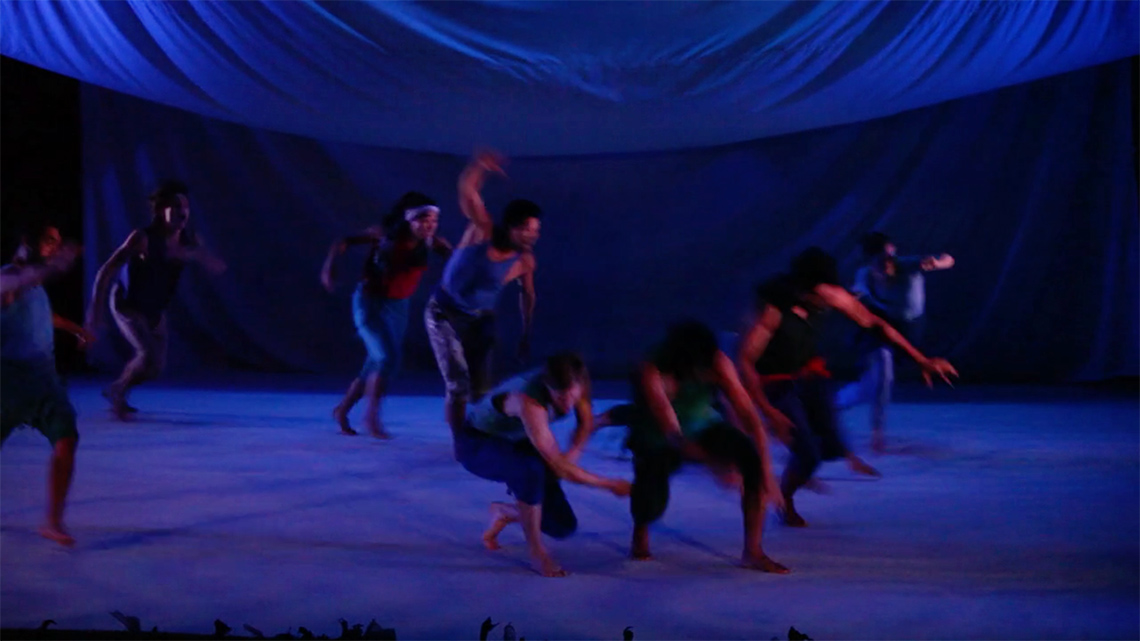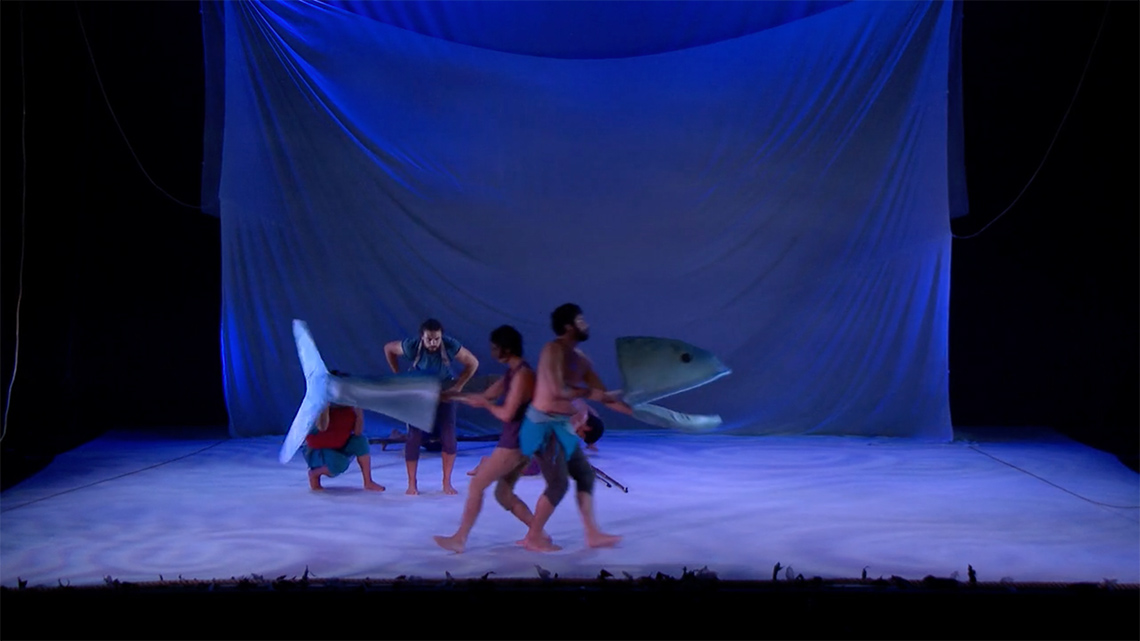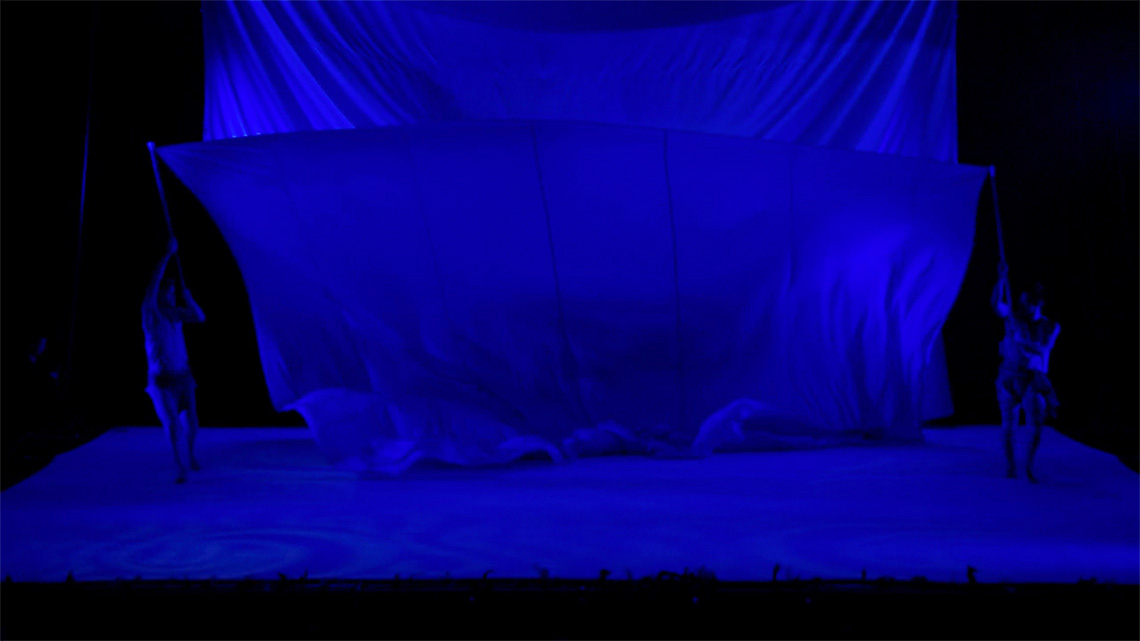Minds On
Today’s vocabulary
Press the following tabs to access today’s vocabulary.
The route or movement taken from point A to point B; or a pattern or design created on the floor or in the air by movements of the body (e.g., the arm moving in a circular motion creates a circular air pathway; galloping across the general space in a zigzag motion creates a ground pathway). The following are some examples.
- air pathway
- ground pathways
Let’s get started!
Explore some scenes from Red Leap Theatre’s performance of Sea.
- How do the dancers use the element of body?
- What locomotor and non-locomotor movements do you notice?
- What body shapes do the dancers use?
- How do the dancers use the element of space?
- What levels do the dancers use?
- In what directions do the dancers travel?
- Along what kind of pathways do they travel?
Check out the following clips from Red Leap Theatre’s performance of Sea to explore the elements of Body and Space.
Action
Get ready, get set…
Task 1: What’s happening?
Explore the clips of Sea again.
What do you think is happening in each clip?
Explore this video entitled “Red Leap Theatre presents work-in-development footage from SEA” to learn more about what the dancers are doing in this clip.
Select the correct answer, then press ‘Check Answer’ to see how you did.
Access this video entitled “Red Leap Theatre presents work-in-development footage from SEA” to learn more about what was happening in this clip.
Select the correct answer, then press ‘Check Answer’ to see how you did.
Check out this video entitled “Red Leap Theatre presents work-in-development footage from SEA” to learn more about what was happening in this clip.
Select the correct answer, then press ‘Check Answer’ to see how you did.
Go!
Task 2: Identifying the elements of dance
Let’s go back to the video clips of Sea.
- What elements of dance are the dancers using?
- How do the elements of dance help the audience understand what is happening?
Choose the best answer to the following questions.
In the first clip, what levels did the dancers use?
Explore this video entitled “Red Leap Theatre presents work-in-development footage from SEA” to learn more about what levels the dancers used in this clip.
Press ‘Hint’ to access a tip that might help you.
The dancers stay at the same level.
Select the correct answer, then press ‘Check Answer’ to see how you did.

Two teachers are talking. The first teacher says, “The dancers all move at a high level.” The second teacher responds, “This helps the main character appear as if they are swimming underwater with different sea creatures.”

In the second clip, what directions do you notice the dancers using?
Access this video entitled “Red Leap Theatre presents work-in-development footage from SEA” to learn more about what directions the dancers travelled in, in this clip.
Press ‘Hint’ to access a tip that might be of help to you.
The dancers are travelling in different directions.
Select the correct answer, then press ‘Check Answer’ to see how you did.

A teacher says, “The dancers at the front and middle of the diamond formation travel forward, and the dancer at the back travels backward. They move together to represent the whale swimming in the water.”

The dancers at the front and middle of the diamond formation travel forward, and the dancer at the back travels backward. They move together to represent the whale swimming in the water.
In the third clip, what pathways do the dancers use?
Check out this video entitled “Red Leap Theatre presents work-in-development footage from SEA” to learn more about the use of the different elements of dance.
Press ‘Hint’ to access a tip that might help you.
Select the correct answer, then press ‘Check Answer’ to see how you did.

Two teachers are talking. The first teacher says, “The dancers are using a straight pathway on the ground. The dancers are using a curvy pathway in the air.” The second teacher responds, “The straight pathway on the ground is like the tide coming in and out. The curvy pathway in the air is like the waves.”

Task 3: Describing similarities
How are the movements of the dancers in Sea the same as movements in another dance?
How are the movements of the dancers in Sea different than movements in another dance?
Compare the dances using one of the following options:
- Option 1: If possible, use the dance piece you may have created in learning activity 4.
- Option 2: Continue with the following example with whale movements.
Check the My Whale Movements activity.
|
My Whale Movements |
|
|---|---|
|
Body |
Space |
|
Locomotor movement: Non-locomotor movement: Shape my body is making (big, small, curved, straight): big, curved |
Level: Pathway: Direction I am travelling (forward, backward, sideways, diagonally): forward |
|
Describe or draw your movements here: Movement #1 Start at a medium level. Travel forwards. Use a curvy pathway. 
Description
A child is running. Below the child there is text that says, "Start at a medium level." Beside the child there is an arrow pointing in the direction they are running. The text below says, "Travel forwards." To the right of the arrow is a curvy line. The text below says, "Use a curvy pathway." Movement #2 Rise to a high level and make a big, curved shape with my arms. 
Description
A sequence of movements done by one person. First, the person has their hands on their head. Then, they move their hands away from their head but keep their arms bent. Then, they stretch their arms up and outward, creating a curved shape. The text above this movement says, "Rise to a high level and make a big, curved shape with my arms."" Repeat my two movements again. |
|
Press the ‘Activity’ button to access the My Whale Movements activity.
Choose one of the following and compare it to the dancers’ movements in Sea.
- locomotor movement
- non-locomotor movement
- levels
- pathways
- directions
Record your thinking using the following graphic organizer.
What will you compare?
- locomotor movement
- non-locomotor movement
- levels
- pathways
- directions
Portfolio
Portfolio
Complete the Dance Pieces Comparison in your notebook or using the following fillable and printable document. If you would like, you can use speech-to-text or audio recording tools to record your thoughts. Consider adding your work to your dance portfolio.
|
I’m going to compare: |
|
|
My dance piece… |
Sea… |
|---|---|
Press the ‘Activity’ button to access Dance Pieces Comparison.
Consolidation
Putting it all together

Portfolio
Portfolio
Using the following organizer, record your responses to the following reflection questions.
Complete the Reflection Questions chart in your notebook or using the following fillable and printable document. If you would like, you can use speech-to-text or audio recording tools to record your thoughts. Consider adding your work to your dance portfolio.
| 1. What other elements of dance did you notice in the piece Sea? |
|---|
|
I noticed… |
| Write or draw to explain your ideas below: |
| 2. Do the movements in Sea remind you of movements you do in your daily life? Write or draw your ideas below |
| Movements from Sea |
| Movements from my life |
Press the ‘Activity’ button to access theReflection Questions chart.
Reflection
How do you feel about what you have learned in this activity? Which of the next four sentences best matches how you are feeling about your learning? Press the button that is beside this sentence.
I feel...
Now, record your ideas about your feelings using a voice recorder, speech-to-text, or writing tool.